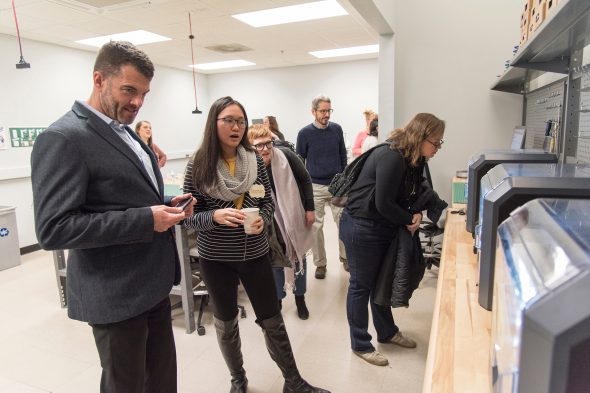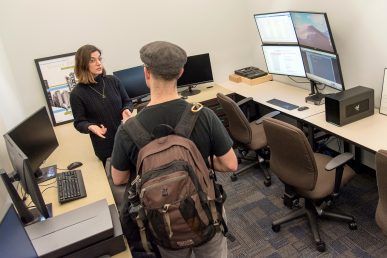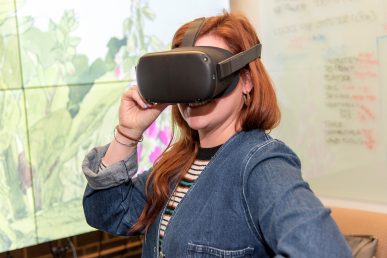Library and Humanities announce opening of digital scholarship hub

The University Library and the Institute for the Humanities at the University of Illinois at Chicago recently celebrated the Digital Humanities Initiative and the opening of the Digital Scholarship Hub at the Richard J. Daley Library. This joint effort will enhance the current and future work of faculty and students throughout the university by developing a greater digital presence on the UIC campus.
The initiative was one of the projects selected from more than 50 proposals to the Presidential Initiative to Celebrate the Impact of the Arts and the Humanities, launched by University President Tim Killeen to enhance and celebrate the arts and humanities at the system’s campuses in Urbana-Champaign, Chicago and Springfield.
“We’re very grateful for that money, for giving us the resources to contribute to the library’s already generous contributions to the technical equipment, to the laboratory itself and to the other parts of the grant, which include GA assistance and an incredible post-doctoral research associate,” Institute for the Humanities Director Mark Canuel said.
During a reception announcing the opening of the hub, Canuel said that Hannah Huber is serving as the Digital Humanities Initiative’s Postdoctoral Research Associate in Digital Humanities. Brian Atkinson is serving as the Digital Scholarship Research Coordinator.
While many think of digital humanities as “just a tech outlier,” Canuel said, it’s simply that many don’t understand how to pair scholarship with digital aspects of presentation and research.
“We have a vision of how organically scholarship, research and technology work well together,” he said. “We have an organic vision of it and now, thanks to the great people working on this initiative that vision is getting to be a reality.”

Students and faculty can meet with a variety of experts to support digital scholarship, including digital humanities, scholarly publishing, data analysis and visualization, geographic information system, or GIS, as well as access tools to incorporate or enhance their research.
Resources available in the Hub include workstation-class systems optimized for GIS, displays to support large-scale visualization, hardware and applications to support 3D prototyping and development in both virtual and physical environments, and systems capable of analyzing large data not requiring high-performance computing, or HPC. Workshops and an upcoming conference highlighting digital humanities are also a big part of the collaboration.
While many of the tools already exist across campus, many of them are limited to grant holders or are in college labs already at capacity for use, Atkinson said.

“Part of what we are trying to do is bring people in, provide resources and tools,” he said. “We’re just trying to provide a level playing field for everyone so they can walk in if they don’t have access to something that they need to propel their scholarship.”
University Librarian and Dean of Libraries Mary M. Case said library officials have been thinking of how to provide opportunities to enhance digital opportunities on campus. She said it was when they partnered with the Institute for the Humanities that “the stars began to align.”
“The benefit that the library can bring to something like this is that we are open to everyone,” Case said. “So, if you’re experimenting with a new technology that you haven’t used before, are looking to gain experience in order to get that grant, or you just want to explore, that is what we are here for: to support the kind of research our faculty and students are doing.”
